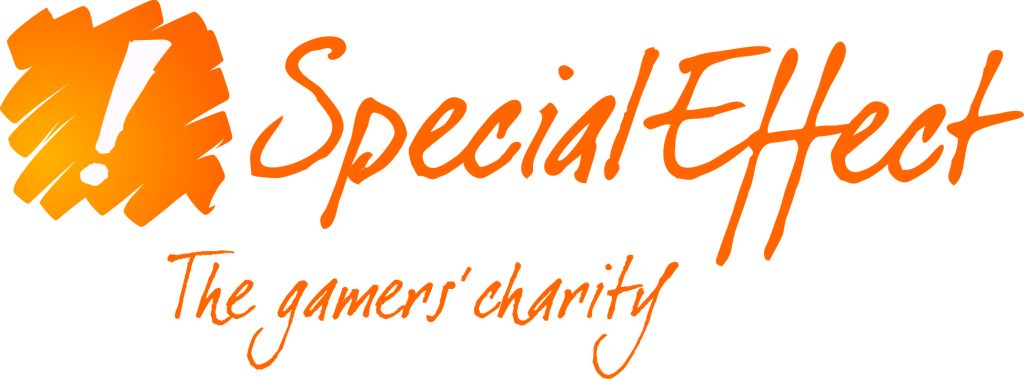
Holly Rose Swinyard explores the life-changing work of the Oxford-based Special Effect – The Gamers’ Charity, who put fun and inclusion back into the lives of people with physical disabilities by helping them to play video games. By using technology ranging from modified joypads to eye-control, they’re finding a way for people to play to the very best of their abilities.
But they’re not just doing it for fun. By levelling the playing field, they’re bringing families and friends together and having a profoundly positive impact on therapy, confidence and rehabilitation…
I, like many people across the world, love playing video games. They offer stress relief, escapism, and a way to interact with stories in a way that can’t be done in any other medium. It’s something that we do every day, pick up a control and play, but what if you can’t just do that?
Earlier in the year I was introduced to the charity Special Effect, a charity based in Oxford who help people with physical disabilities access specialist technology, advice and support so that they can enjoy video games, leisure technology and communication in the same way that able bodied people do. They aim to help people no matter what age or physical disability enjoy the fun and friendship that can be found in video games.
I’ll be honest – it wasn’t something that had crossed my mind, that video games weren’t accessible by a whole group of people, and that they could have such a positive impact on people’s lives, so I wanted to find out more. How did it work? Who could they help? What sort of equipment did they use?
So many questions, so I sat down with Special Effect’s communications officer, Mark Saville, to get to bottom of this amazing organisation…
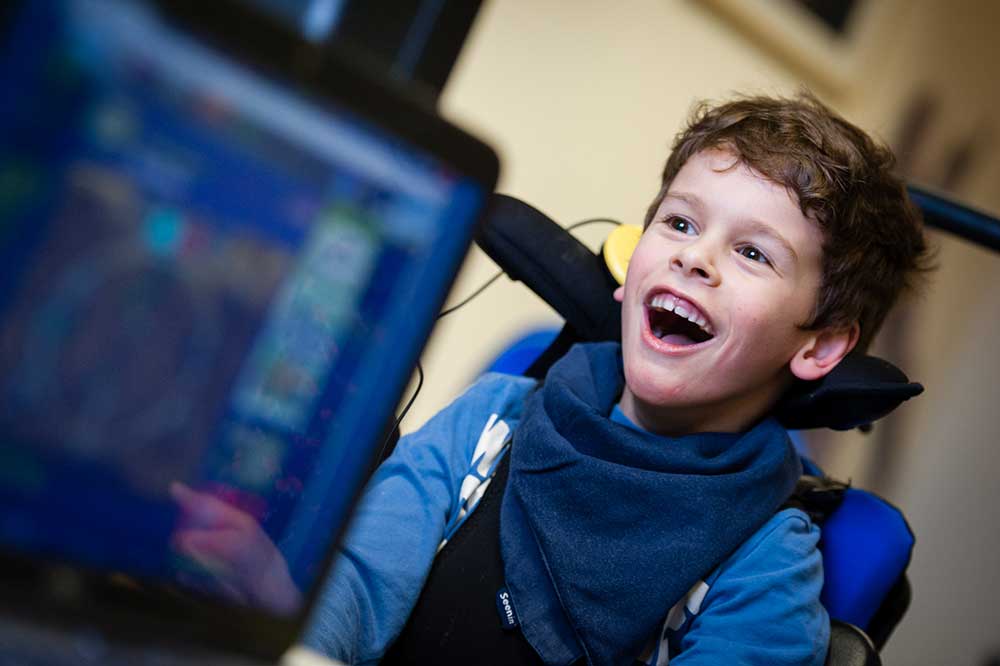
Mark Saville: We’ve been going ten years now, and our CEO, Dr Mick Donegan, started this because he used to work for a charity that helped very severely disabled kids in education to speak, if you think about Stephen Hawking, the kind of tech he used, which was great. He was helping them to communicate in the class room but at the end of the day, every single day, the parents of these kids were coming up to him and saying “This is great, but does my kid do at the weekend? What do they do in the evenings? They have no way of connecting with their friends or family or anything”.
This was a time when video games were really on the rise, ten years ago, so he thought, look, there’s so many real, actual leisure activities that these people can’t take part in, football or even sort board games, and their being denied access to the online versions as well. So the charity was set up to help with the second part of that so we can at least give people a level playing field on the online side.
Holly Rose Swinyard: I watched a lot of the videos you guys have on YouTube, with the people you help and how you set stuff up, and the different ways of controlling the games are fascinating. The eye gear, where people are just looking at stuff, that’s amazing, the kit you have is incredible. So how did you come to create and work what sort of thing you needed for each specific person who comes to you?
Mark: We don’t believe that you can create a controller for disabled people, because there’s so many different types of disability and so many different types in the way that disability presents. I mean, within cerebral palsy with spasm, you can have people who spasm outward and inward, and with something like muscular dystrophy, which is degenerative, your abilities are going to change over time. Somebody for example who’s come back from war, missing a thumb needs something completely different from someone with muscular dystrophy, who’s lost all power expect for a couple of millimetres of movement in the end of their fingers or something.
So every single set up we do is custom and we go out to visit people and or they come here and our team of therapists and tech specialists, create a setup which is just right for them because it’s really the only way we can do it.
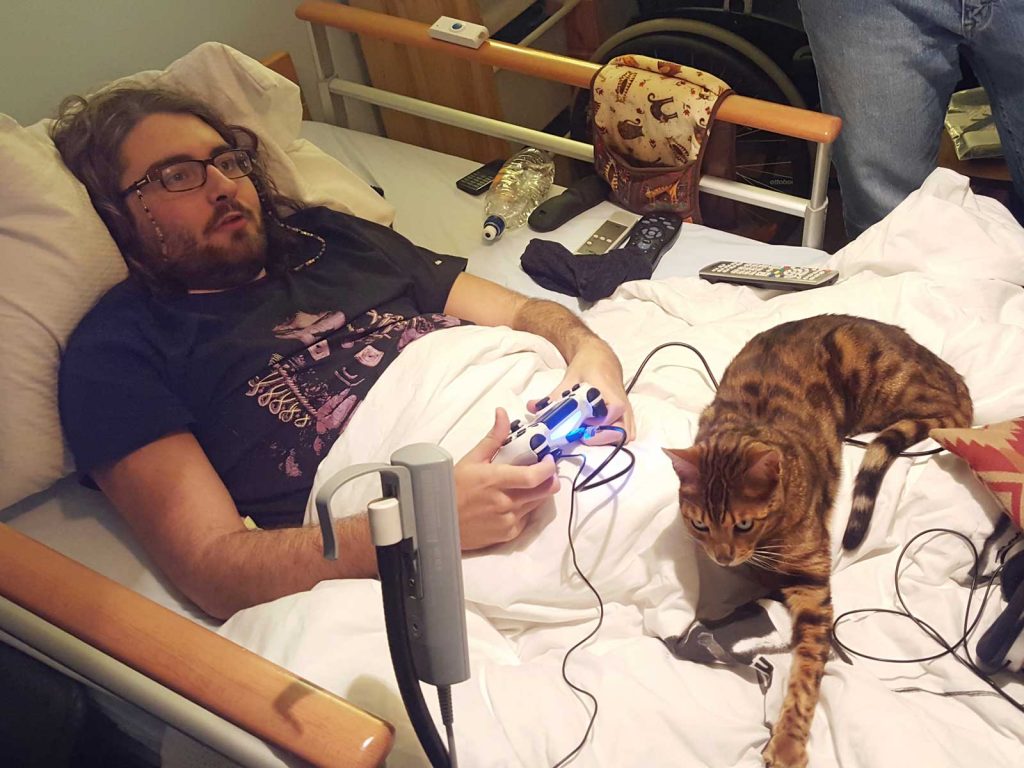
The way it works is, people get in touch with us, saying – for example – “I’ve got a spinal injury, I’ve fallen off my bike and I can only move my head and my shoulders but I want to play Fifa” and we’ll say OK, and we’ll go along to their house with a massive box of equipment and try it all out, all sorts of bits and bobs, we’ll match, we’ll modify, and perhaps we might get them playing Fifa with a chin joysticks and two shoulder switches. We’re helping people of all ages, we recently helped someone who’d had a stroke and just wanted to play with his nephew, so it’s a real range.
The whole point of this is to give inclusion, the impact is to give people the quality of life that they had before.
Holly: The quality of life that you guys manage to give with this is amazing, It really does seem to change people’s lives. Do you think this is something that is lacking the more “mainstream” help and healthcare services? Obviously there’s a lack of funding, but do you think there is more that can be done there?
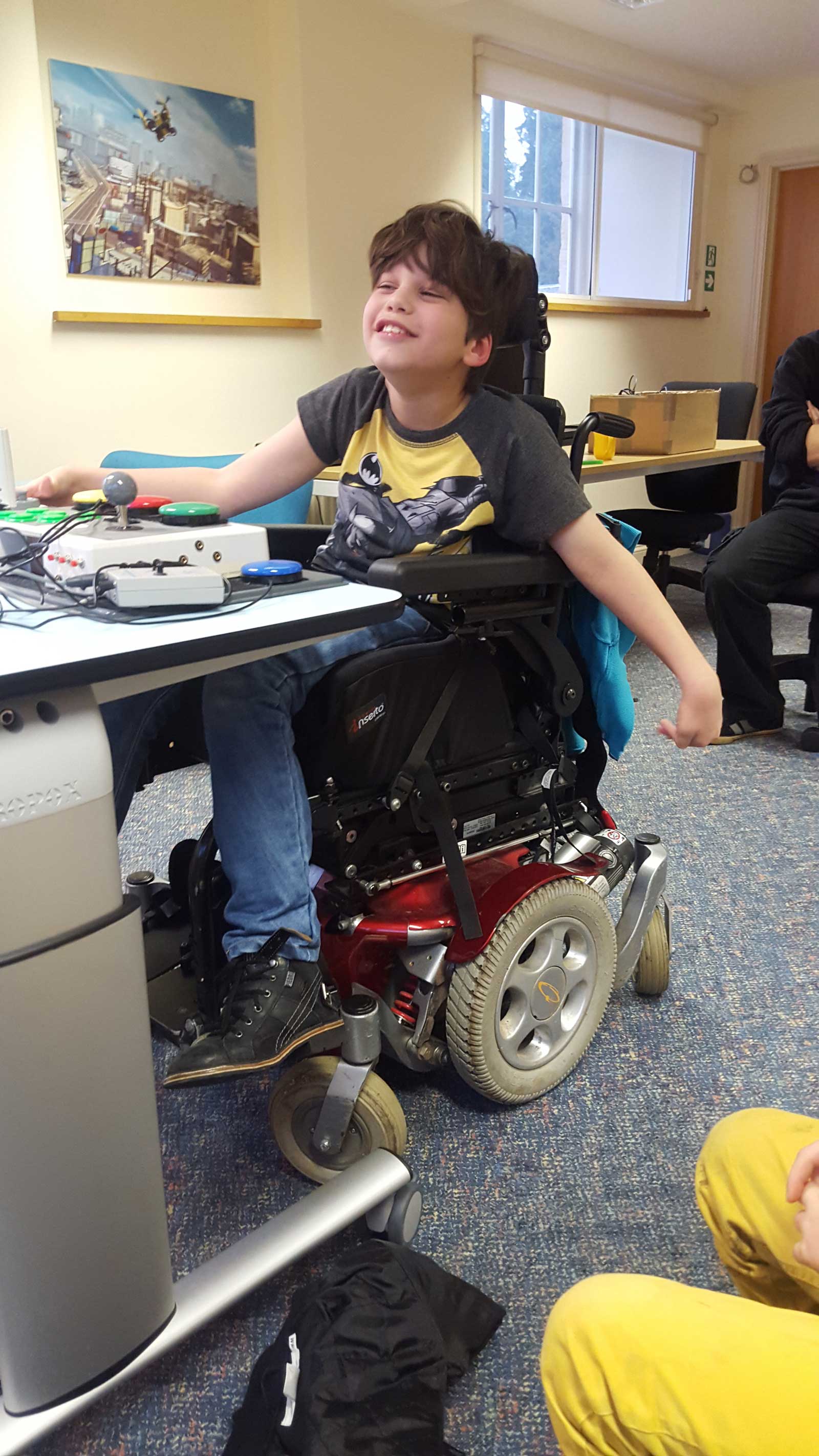
Mark: It’s absolutely fine with the NHS, they have their priorities, clinical priorities, they need to help people with their injuries and help them to get better. In a sense, we’re working to help people to interact with the entertainment industry, which I suspect wouldn’t be top of the NHS’s priorities [laughs]. But that doesn’t mean to say that in terms of quality of life, that is doesn’t have a big place.
We’re seeing people with things like motor neuron disease, who’s quality of life can be just sitting in their wheel chair, watching whatever TV channel is put on for them and then we come along and within a day we can have set up whatever they need to play Call of Duty or Fifa or whatever, and they can get totally engrossed in what they are doing, and being able into engage with their family and the rest of the world. That’s what we want, that’s exactly what we want.
There’s so many different types of impacts as well, which go beyond what we were expecting, it’s not just fun. We’re giving people, parents and carers, a lot of respite time. If you’ve got somebody with a severe disability who loses themselves in a game for a few hours, that’s time that people wouldn’t have before. It was great recently, we had a parent say to us “thank you for making me feel better as a parent, that I can actually give my daughter something to do independently, that she feels good about.” I feel I completely went of the question you asked there but yeah [laughs].
Holly: [Laughs] It’s interesting. For me, I can just pick up my Playstation 4 controller whenever I want and play, but for these people you’re helping it’s their life line to a certain extent, you do see that in the videos on your YouTube and hearing it from you, it’s a real improvement in their lives. It’s a connection to the real world that they didn’t have before.
I saw that you helped someone who’d had an accident and you’d made a setup so he could finish his PhD with eye control, do you do a lot of that?
Mark: you may have noticed on the site, that even though the main site is all about the gaming and the gaming charity, we do have another side to us, which is the Stargaze site. This is helping people with a sudden traumatic injury and helping them communicate and gain a bit of independence again through eye control.
We were finding that people who’ve just gone into intensive care after severe accidents, and we’ve got their parents ringing up and saying “My child is in a really bad place, is there anything you can do to help?” And what this has turned into is, basically, a service where intensive units from hospitals now ring us up and ask us to come and see if we can get patients, who maybe have broken their back and have a tracheotomy and can’t speak, and set up eye control to help them communicate and give them back some of their independence.
Holly: I came across you guys at EGX, but I hadn’t heard of you before then, despite having been to a number of gaming shows and events, so how do you get the word out there, since a lot of your clients come to you rather than the other way around, apart from at these events? Is it through hospitals or respite care?
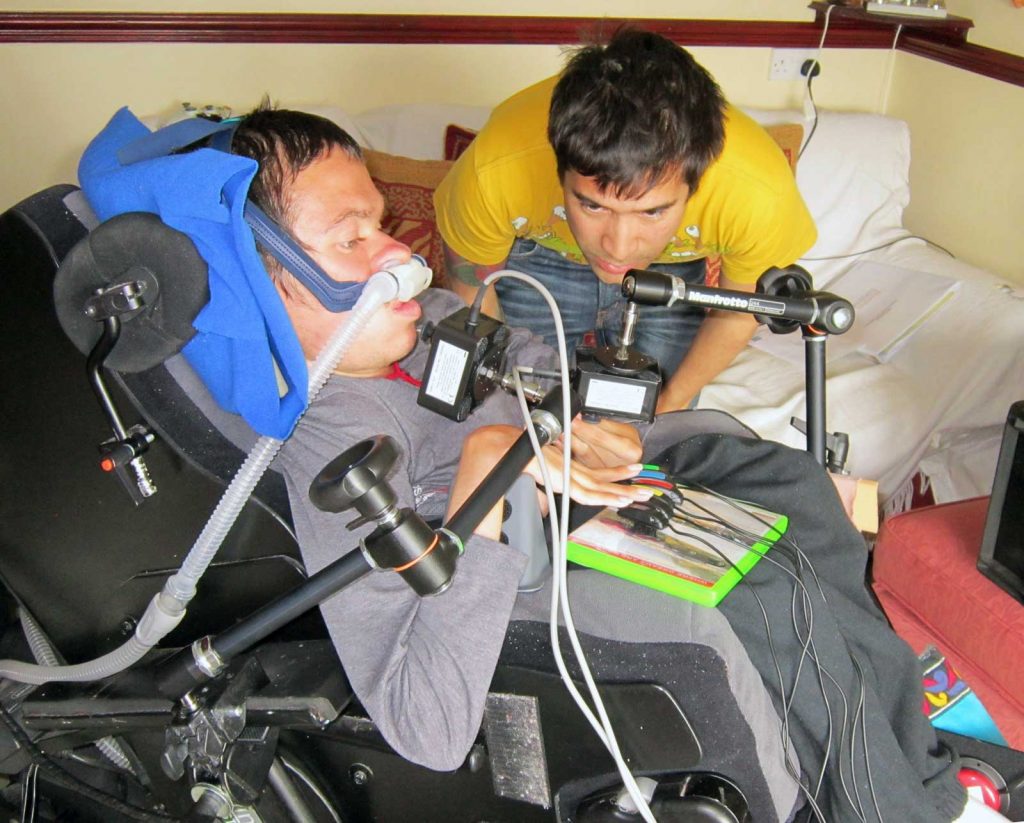
Mark: There are two aspects to us wanting to get the word out, the first is for fundraising and the second is for awareness so that people can come to us for help. What we’ve got to do is manage that quite carefully. For example about five years ago one of our videos got picked up by one of the American TV channels and went viral, which meant for days afterwards we were getting a deluge of requests from the United States asking us to help, which was, unfortunately, something we couldn’t do, being based in the UK].
But at the same time we’ve had a lot of support from the gaming community over the years, people like Multiplay and Jagex have really embraced us and given us a visibility at expos, like EGX, that we wouldn’t have otherwise had.
Holly: I was amazed when I saw you guys there, and got to try out the equipment, because you do have some of your gaming set ups there for people to have a go with, and that really opened my eyes to something I didn’t know existed and it’s great that it does exist. It helps people not only think “I should support this” but also to give some insight and understanding into the lives of those you help.
Mark: I’m so glad you said that, because it’s absolutely right. So many times, people don’t really don’t get what we are trying to do until they’ve actually tried it and suddenly it clicks when they use the eye gaze of a chin joystick. So we have to push it out there via the videos to give people that understanding and also through support and awareness through gaming companies.
Holly: I think it’s great, especially since there’s a perception in the media that video gaming is a negative thing, that they are violent and aggressive but you guys see gaming genuinely improve quality of life and be a positive force, so what would you say to someone who did think these negative views about gaming, especially if it was the parent of a child you could help?
Mark: That’s a very good question, and in some ways we try to very hands of in terms of people being entitled to their opinions, it would be a waste of our time arguing when we could be helping someone, which is also why we don’t get involved in a lot of the debates about accessibly gaming. But if it’s somebody like that [with a disabled child], I would refer them to our videos, and I had this once, to show them the change it can make.
You can see the looks on these kids’ faces, and you kind of think “oh video games aren’t that bad”. But it has been a problem, especially when we are approaching large trusts and foundations for funding, some of them have been a bit, how should I put it, staid about the whole process.
The whole thing about gaming, is that when it started it was 13 year olds in their bedrooms, and now those gamers are now MDs in charge of these companies, so it’s a generational thing so we’re hoping that we’ve got through that initial push back.
Holly: Gaming has definitely become more mainstream now, we even have TV shows dedicated to it, as well as streaming like twitch, and most of all with the e-sports. Are e-sports something that your clients can engage in and take part in?
Especially since, like you said, they can’t take part in leisure activities like football, or any sort of competitive sport a lot of the time, are e-sports something that can help disabled people enjoy that competitiveness and be part of teams in a way they couldn’t before?
Mark: Yeah, definitely and you can see it sometimes. Our CEO mentioned it to me the other day that he’d seen someone who’d had a set-up made so he could play with his brother and [our CEO] said that the look of competitiveness on the faces of both of these boys now that they had a level playing field was amazing, and that goes all the way through to the online gaming communities.
And it’s great when we hear about people bossing a dungeon on say, World of Warcraft, or something like that or their actually climbing the leagues in these games and in the e-sports. So there are disabled people doing this stuff and they are people that our clients can look up to which is great.
Holly: Do you think it allows a sense of accomplishment that they wouldn’t have necessarily had before?
Mark: Oh yes, there is definitely a bragging rights factor! [Laughs] Especially for the younger people we help, to be able to boast about “well I beat you last night” that’s just the normality you want to bring back into their lives that they didn’t have before.
Holly: You mentioned that the community have really supported you, so before we finish, do you involve the gaming community in fundraising?
Mark: Actually, that’s something that’s really taken us by surprise, because it was a bit of a toe in the water, is our Game Blast Weekend which we run every February now. We ask gamers to do 24 hour gaming marathons for us, and create Just Giving pages to raise money for the charity. It’s been a complete success.
• You can find more information on Special Effect – The Gamers’ Charity and what they do on their website www.specialeffect.org.uk where you can also get involved in their fund raising events, volunteer or contact them for help. If you want to see how they put all of this into practice go to their Youtube channel or follow them on Twitter @specialeffect
 Holly Rose Swinyard was once described as a 21st Century Marlene Dietrich…. But if that film icon was British and a cosplay geek. A self-proclaimed fashion experimentalist and long-time cosplayer, Holly writes about their experiences working their through these two very eccentric worlds, and how they have found themselves through creating, crafting and cravats.
Holly Rose Swinyard was once described as a 21st Century Marlene Dietrich…. But if that film icon was British and a cosplay geek. A self-proclaimed fashion experimentalist and long-time cosplayer, Holly writes about their experiences working their through these two very eccentric worlds, and how they have found themselves through creating, crafting and cravats.
• Follow Holly on Twitter @lilistprince | Instagram – @lilprincecostumes | Facebook | Blog | Patreon
• Holly is also the Editor of The Cosplay Journal, a new coffee table magazine which focuses on the diversity and craftspersonship of the UK cosplay community. You can check it out at www.thecosplayjournal.com
All Special Effect-related images courtesy Special Effect – The Gamers’ Charity
One of many guest posts for downthetubes.
Categories: downthetubes News, Games
 Ark: The Animated Series debuts in North America on Paramount+, ahead of international release
Ark: The Animated Series debuts in North America on Paramount+, ahead of international release  Comic artist Vivian Truong is this year’s World Book Day illustrator
Comic artist Vivian Truong is this year’s World Book Day illustrator  RapidEyeMovers announce brand-new games festival, ‘Humanise’, in Kendal
RapidEyeMovers announce brand-new games festival, ‘Humanise’, in Kendal  Tintin Reporter – Cigars of the Pharaoh game launched
Tintin Reporter – Cigars of the Pharaoh game launched